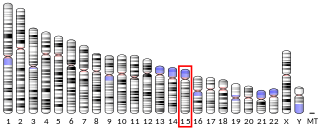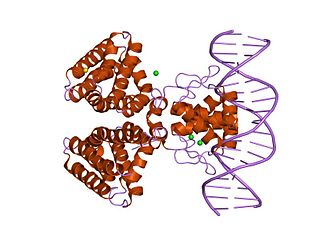HNF4 is a nuclear receptor protein mostly expressed in the liver, gut, kidney, and pancreatic beta cells that is critical for liver development. In humans, there are two paralogs of HNF4, HNF4α and HNF4γ,encoded by two separate genes HNF4A and HNF4G respectively.

Mitogen-activated protein kinase 8 is a ubiquitous enzyme that in humans is encoded by the MAPK8 gene.

ADP-ribosylation factor 1 is a protein that in humans is encoded by the ARF1 gene.

Sodium-hydrogen antiporter 3 regulator 1 is a regulator of Sodium-hydrogen antiporter 3. It is encoded by the gene SLC9A3R1. It is also known as ERM Binding Protein 50 (EBP50) or Na+/H+ Exchanger Regulatory Factor (NHERF1). It is believed to interact via long-range allostery, involving significant protein dynamics.

Sodium-hydrogen exchange regulatory cofactor NHE-RF2 (NHERF-2) also known as tyrosine kinase activator protein 1 (TKA-1) or SRY-interacting protein 1 (SIP-1) is a protein that in humans is encoded by the SLC9A3R2 gene.
The enzyme lysophospholipase (EC 3.1.1.5) catalyzes the reaction

Phospholipase A2, membrane associated is an enzyme that in humans is encoded by the PLA2G2A gene.

Serine/threonine-protein kinase N1 is an enzyme that in humans is encoded by the PKN1 gene.

1-Phosphatidylinositol-4,5-bisphosphate phosphodiesterase beta-2 is an enzyme that in humans is encoded by the PLCB2 gene.

Calcium-dependent phospholipase A2 is an enzyme that in humans is encoded by the PLA2G5 gene.

1-Phosphatidylinositol-4,5-bisphosphate phosphodiesterase beta-3 is an enzyme that in humans is encoded by the PLCB3 gene.

1-Phosphatidylinositol-4,5-bisphosphate phosphodiesterase delta-1 is an enzyme that in humans is encoded by the PLCD1 gene. PLCd1 is essential to maintain homeostasis of the skin.

Astrocytic phosphoprotein PEA-15 is a protein that in humans is encoded by the PEA15 gene.

Cytosolic phospholipase A2 gamma is an enzyme that in humans is encoded by the PLA2G4C gene.

Group 10 secretory phospholipase A2 is an enzyme that in humans is encoded by the PLA2G10 gene.

1-Phosphatidylinositol-4,5-bisphosphate phosphodiesterase delta-4 is an enzyme that in humans is encoded by the PLCD4 gene.

MAP kinase-activated protein kinase 5 is an enzyme that in humans is encoded by the MAPKAPK5 gene. The protein encoded by this gene is a member of the serine/threonine kinase family. In response to cellular stress and proinflammatory cytokines, this kinase is activated through its phosphorylation by MAP kinases, including MAPK1/ERK, MAPK14/p38-alpha, and MAPK11/p38-beta. In vitro, this kinase phosphorylates heat shock protein HSP27 at its physiologically relevant sites. Two alternately-spliced transcript variants of this gene encoding distinct isoforms have been reported.

Phospholipase A2, group IVB (cytosolic) is an enzyme that in humans is encoded by the PLA2G4B gene.
In molecular biology, autophagy related 3 (Atg3) is the E2 enzyme for the LC3 lipidation process. It is essential for autophagy. The super protein complex, the Atg16L complex, consists of multiple Atg12-Atg5 conjugates. Atg16L has an E3-like role in the LC3 lipidation reaction. The activated intermediate, LC3-Atg3 (E2), is recruited to the site where the lipidation takes place.

In molecular biology, the fatty acid metabolism regulator protein FadR, is a bacterial transcription factor.

















